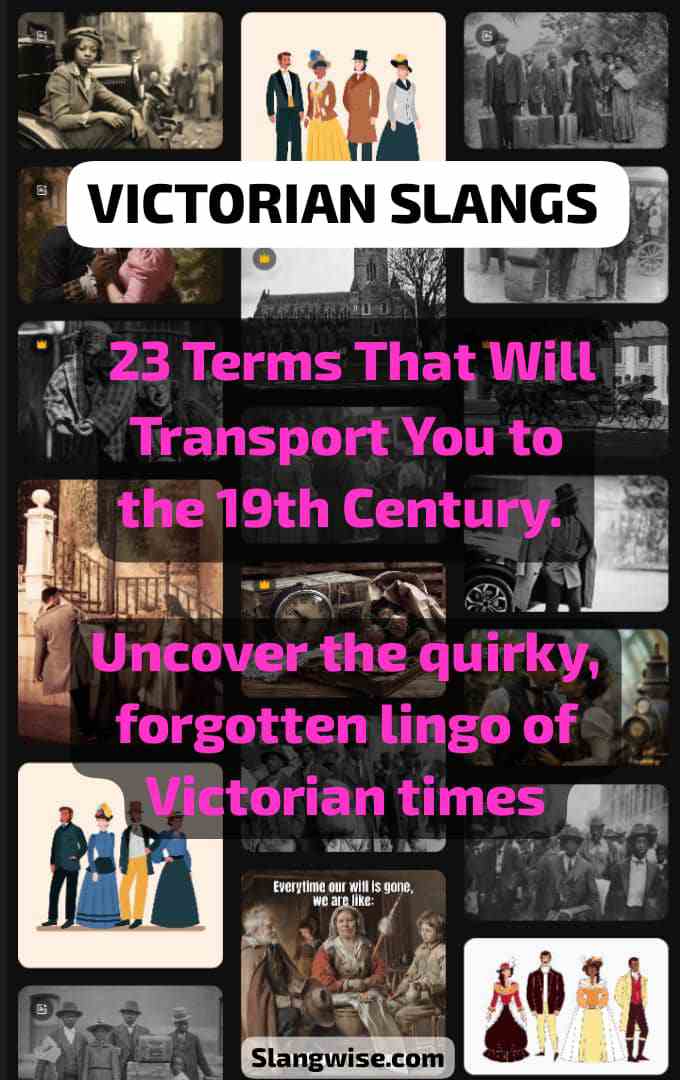From foggy London streets to parlor-room chit-chat, Victorians spoke in a rich tapestry of idioms and slang. These 23 quirky terms open a door to the manners, amusements, and anxieties of the 19th century.
Each phrase carries social weight, whether signaling class, indicating scandal, or sparking laughter. Though many have fallen silent, their echoes still linger in literature, music halls, and the occasional modern utterance.
This guide adopts an expert eye to trace each term’s origin, meaning, and usage, supported by authority sources such as the Oxford English Dictionary and the British Library’s Victorian collections.
Below are the 23 Victorian slang terms, each explained with practical examples.
Table of Contents
In A Nutshell
- The 23- Victorian slang list: Toady, Buck’s night, Gor blimey, Blighter, Jammiest bits, Mutton shunter, Peeler, What ho!, Flummery, Lamplighter, Moonraker, Cove, Charmin’, Rook, Slapdash, Tom-and-Jerry, Doxy, Nincompoop, Skirl, Tosh, Vig, Wet blanket, Brummagem.
- Core themes: these expressions reveal Victorian life, class markers, moral judgments, street humor, and leisure culture (from grooms’ revels to police nicknames).
- Origins & authority: each term is traced to historical sources and etymologies (e.g., OED, British Library), showing roots in occupations, rhyming slang, dialects, theater, and foreign borrowings.
- Why it matters: the words illuminate manners, anxieties, and humor of the 19th century; some survive in modern idioms while others offer fresh literary color for readers and writers exploring Victorian settings.
Slangwise thought: “Old words carry secret stories, unlock them and the past speaks in living color.”
So, What are these Victorian Slangs / 19th Century Slangs
1. Toady
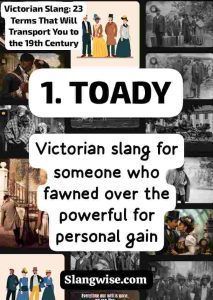
Toady was a Victorian slang for someone who fawned over the powerful for personal gain, its name comes from the charlatan doctors who claimed feeding live toads cured diseases, then flatteringly touted their own medicines as miraculous (Oxford English Dictionary) .
2. Buck’s night
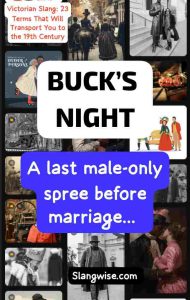
In the 1860s, young grooms would hold a “buck’s night,” a last male-only spree before marriage, “buck” being slang for any spirited young man enjoying one final evening of revelry.
3. Gor blimey
Cockney Londoners would exclaim “gor blimey”, a softened oath from “God blind me!”, to express astonishment without risking blasphemy (British Library Cockney Archive) .
4. Blighter
Calling someone a “blighter” meant labeling them a wretch or rascal, derived from the idea of “blight” that spoils or destroys, painting the person as wholly disagreeable.
5. Jammiest bits
When Victorians spoke of the “jammiest bits,” they meant the choicest morsels of food, and by extension, the very best snippets of news or gossip, likening juicy tidbits of information to a treasured preserve.
6. Mutton shunter
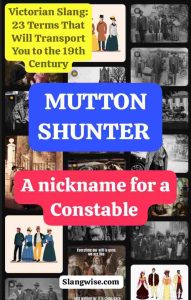
Through playful rhyming slang, a “mutton shunter” became a nickname for a constable, “shunter” rhyming with “copper”, and carried the same wary respect as any law-enforcer on the beat.
Read Also: The 37 most popular British slang words of 2025 – #14, #21 and 29
7. Peeler
Named after Sir Robert Peel, who founded London’s metropolitan police in 1829, a “peeler” was another common term for a policeman on patrol, often seen patrolling gaslit streets.
8. What ho!
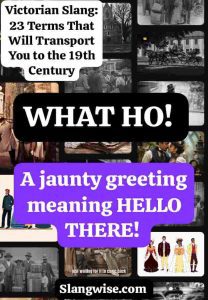
A jaunty greeting, “What ho!”, would ring through parlors and promenades, essentially meaning “hello there” with the sprightly air of an invitation to chat.
9. Flummery
Borrowing the name of a wobbly, bland pudding, “flummery” described empty compliments or idle chatter too fluffy to have substance.
10. Lamplighter
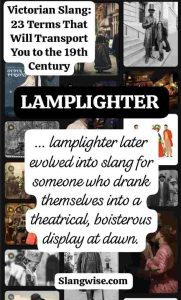
Originally the literal jobtitle for those who lit gas lamps each evening, “lamplighter” later evolved into slang for someone who drank themselves into a theatrical, boisterous display at dawn.
11. Moonraker
A “moonraker” was either a gullible soul who tried to rake the moon’s reflection from a pond or a crafty smuggler in Cornwall, both images emphasizing either innocence or sly cleverness.
12. Cove
Simply a plainer way to say “chap,” a “cove” was any ordinary fellow on the street, perhaps borrowing from rural terms for livestock like cattle.
13. Charmin’
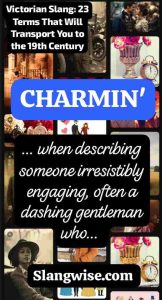
Stage and theater circles clipped “charming” to “charmin’” when describing someone irresistibly engaging, often a dashing gentleman who had the ladies’ attention.
14. Rook
To “rook” someone was to swindle or cheat them outright, borrowing the name of the thieving rook bird that delighted in stealing eggs from nests.
15. Slapdash
If a job was done “slapdash,” it was executed with careless haste, as if slapped together in a dash, resulting in shoddy or unfinished work.
16. Tom-and-Jerry
Named after the popular “Life in London” play, a “Tom-and-Jerry” referred to a raucous brawl or outré drinking party that ended in uproar and chaos.
17. Doxy
A “doxy” referred to a mistress or streetwalker, a term that had drifted from earlier dialect words for a woman kept outside respectable society.
18. Nincompoop
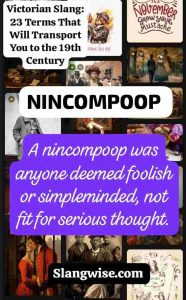
Likely echoing Latin non compos mentis (“not of sound mind”), a “nincompoop” was anyone deemed foolish or simpleminded, not fit for serious thought.
19. Skirl
Borrowed from Scots Gaelic for a piercing cry, “skirl” described the loud, wailing sound, like bagpipes or a frightened shriek, that could unsettle any drawing-room gathering.
20. Tosh
Short for “toshery,” once slang for the city’s sewers, “tosh” came to mean rubbish or utter nonsense, anything best flushed away.
21. Vig
In gambling circles, the “vig” (short for “vigorish,” from Russian for interest) was the bookmaker’s commission, the ever-present cost of placing a wager.
22. Wet blanket
Just as a literal wet blanket smothers a fire, calling someone a “wet blanket” meant they quashed everyone’s fun by dampening the mood.
23. Brummagem
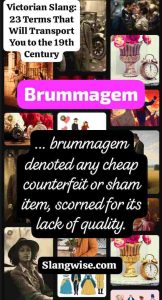
Originating from Birmingham’s mass-produced imitation goods, “brummagem” denoted any cheap counterfeit or sham item, scorned for its lack of quality.
Read Also: 10 Classic Slang Words That Never Get Old – #8 is a must known for every millennials and Gen Zs.
Conclusion
These 23 Victorian slang terms reveal a world both foreign and familiar. They paint portraits of social climbers, revelers, law enforcers, and jesters.
Their vivid images; flummery’s fluff, tom-and-jerry’s chaos, brummagem’s sham, still sparkle in classic novels, period dramas, and the roots of modern idioms.
By exploring these expressions, scholars and enthusiasts gain fresh insight into Victorian manners, humor, and class distinctions. Some phrases have faded completely; others endure, hidden beneath everyday speech.

